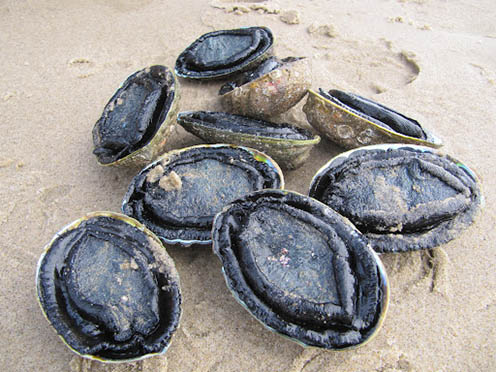Woman sentenced for shellfish “black market”

Brianna Stewart
A Kawerau woman who created a “black market” selling pāua and kina from a fake Facebook account has been sentenced to a combination of community detention and community work.
Shantell Te Riwhiri Munro, 35, was sentenced in Whakatāne District Court on Wednesday to 150 hours’ community work and three months’ community detention.
The sentence was imposed on three charges of breaching the Fisheries Act 1996, by selling fish for benefit, offering to sell fish with the intention of obtaining a benefit, and possession of fish for the purpose of sale. It was prosecuted by the Ministry for Primary Industries.
According to the summary of facts obtained by the Beacon, the offending started in February 2023 and occurred in the Hawke’s Bay.
She used Facebook – both her personal profile and a fake one she made under the alias “Joe John Meka” – to advertise her recreational catches, then met up with buyers.
All the transactions happened in carparks in Hastings and Waipukurau. Munro harvested from the Central Hawke’s Bay coastline.
On February 5, she texted family and posted a photo to her personal Facebook of minced pāua collected during a recent dive.
The following day, she travelled to the Hastings Kmart carpark and sold five snaplock bags of pāua to an unknown person in exchange for meat.
In the next seven weeks, Munro sold 31 bags of kina and 42 bags of pāua.
Four of her buyers paid cash, with five trading meat. Munro charged up to $35 for a small bag of kina and up to $75 for a large bag of pāua.
MPI states that is in line with market commercial values.
Munro made a further sale in October of four bags of kina and four of pāua, which were traded for meat.
She made three other offers to sell kina and pāua via her alias Facebook profile in October but said they did not result in any sales.
Munro sent a photo to a known fish buyer of two bags containing a significant amount of pāua in March. She admitted they contained approximately 100 pāua harvested by her, which were all “probably under the legal-size limit.”
The haul was about 20 times the legal daily limit of a recreational fisher.
In total, Munro received $980 in cash and additional meat products for her sales.
She admitted to making another 20 transactions that were not detected by the MPI investigation.
Because she is not a commercial fisher, a licensed fish receiver, or a fish farmer, it was illegal for her to sell seafood.
Judge Louis Bidois said Munro had effectively created a shellfish black market.
In sentencing her, the judge acknowledged that Munro was remorseful and had made full admissions to the Fisheries officer.
He said she was disconnected from her culture and had full knowledge that what she was doing was illegal.
Judge Bidois said Munro’s offending had impacts on other fishers and gatherers, both commercial and recreational, and on retailers.
MPI viewed the offending as theft of a shared resource.
The summary of facts said that view was shared by iwi, fishery stakeholders and the wider public.
“Harvesting for the purpose of sale, as has occurred here, puts at risk the easy access for other members of the community.”
MPI noted that many recreational fishers had been operating in a pseudo-commercial capacity and were selling their catch to service a large black market.
They said the activity had several impacts, including compromising New Zealand’s ability to manage seafood stock to achieve maximum sustainable yield; limiting the potential growth of the country’s commercial kina and pāua fisheries; and causing annual loss of revenue measuring in millions of dollars.
MPI said it also has the potential to impact negatively on the country’s reputation for quality product; is cause for considerable food safety concerns; and restricts the rights of both legitimate recreational and customary fishers to access the kina and pāua stocks.
In addition to the community detention and community work, Judge Bidois ordered Munro to forfeit property she used in the commission of her offending.
That included a hand mincer, snorkel, dive mask and dive knife. A vehicle used by Munro to transport the fish to buyers was not included in the forfeiture order.
Judge Bidois said he made that decision because the vehicle belonged to Munro’s brother-in-law, who was not involved in the offending, and it would cause him hardship.
Fisheries New Zealand District Manager (Hawkes Bay, Wairarapa, Chatham Islands), Mike Sutton, said the court’s response sent a strong message to anyone considering selling recreationally caught seafood online – there are serious consequences.
“We are investigating a second case related to online sales in the area,” he said.
“Our 0800 4 POACHER line (0800 476 224) frequently gets reports of possible social media sales of seafood. We regularly monitor online markets and will hold anyone involved in this illegal behaviour to account.
“Poaching and selling recreationally caught seafood affects sustainability of our shared fishing resources. We take this type of offending very seriously and will prosecute.”
Last week, a poacher in Porirua was jailed for two and a half years after being found with 619 pāua that he intended to sell.